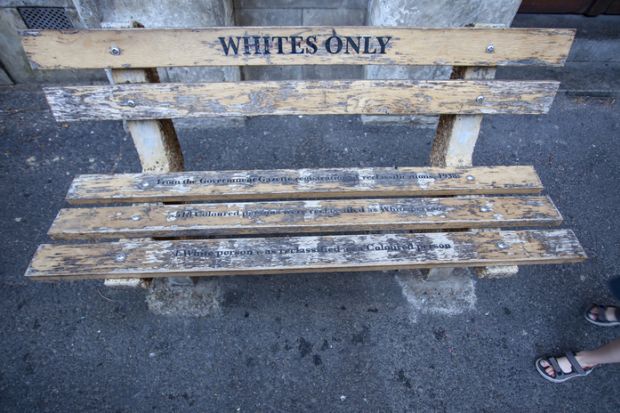Of all the international social movements of the 20th century, the anti-apartheid movement was the one that arguably drew the strongest and most sustained support and solidarity from students and faculty at universities around the world. But as, this month, we celebrate the 30th anniversary of the advent of multi-party democracy in South Africa, we need to reflect on whether victory was declared too hastily.
It is striking how quickly such a sustained and multi-pronged movement retreated and abandoned black South Africans (and South Africans generally) as soon as Nelson Mandela was elected the country’s first black president. There was a mistaken assumption globally that the defeat of apartheid would herald a new era of racial equality and social justice in the country without further international assistance and pressure.
But that era didn’t transpire. And it is odd that academics, of all people, assumed that it would. After all, neither the abolition of slavery in 1865 nor the granting of civil rights in 1964 had that effect in the US. Nor did the achievement of independence by other African countries formerly under British, French, Belgian, Portuguese, German, Italian and Spanish colonial rule.
While some of those countries, such as Botswana and Tanzania, managed to maintain peace and reject the racism of colonial rulers even while struggling with poverty and governance failures, many others simply exchanged one type of authoritarianism for another, often preceded by extensive civil war and mass violence that targeted civilians.
In Rwanda, for instance, the racism that had been codified into Belgium’s colonial rule was transferred to the independent state post-1962 and gained a new enforcer: the Hutu supremacist majority, whose infamous genocide of Tutsis also began 30 years ago this month.
In South Africa, too, the racist social inequalities and injustices that were codified by apartheid remain entrenched in the political, economic and social system. In every domain of South African life – from healthcare to housing, education to employment, crime to economic opportunity – black South Africans continue to experience apartheid’s damaging impacts.
Yes, black South Africans have far greater civil and political rights and freedoms than they did under apartheid. And, yes, government policies are no longer intentionally racist; Mandela’s African National Congress (ANC) has enjoyed a near monopoly on power since 1994. Yet the enduring discrimination that occurs in all those spheres of life continues to have racist outcomes.
Nor are black South Africans the only victims of discrimination. The South African constitution – which was deeply informed by the ANC’s Freedom Charter and subsequent development of South Africa’s Bill of Rights – promises equality for women and for individuals identifying as LGB, but the reality of South African life is such that both groups still experience enormous discrimination and violence.
The reality is that ANC governance is characterised by state capture, nepotism, corruption and criminality. Tens of billions of dollars have been stolen from South Africa’s public coffers that should have been directed to social welfare programming to fulfil the social and economic rights protected by the constitution. At the height of the Covid pandemic, for instance, widespread corruption and theft of state health resources led to many avoidable deaths, predominantly among black South Africans.
Meanwhile, people from other African countries living in South Africa have faced violence, discrimination and persecution for years now – leading to hundreds of murders – with, again, little proactive political leadership to prevent this.
Nor has the ANC done anything to protect African minorities in their own countries. Mandela’s successor, Thabo Mbeki, recently acknowledged the ANC’s indifference to the Rwandan genocide in 1994 and its refusal to take meaningful action to try to stop it (his refusal to believe that HIV was the cause of Aids and introduce antiretroviral drugs also led to the preventable deaths of an estimated 330,000 mainly black South Africans from the disease).
South Africa has also been criticised for allowing former Sudanese president Omar al-Bashir to leave the country despite an international arrest warrant having been issued against him for alleged genocide and war crimes in Darfur; both the South African courts and the International Criminal Court ruled that the country’s refusal to arrest al-Bashir was a violation of its human rights obligations.
South Africa has also provided diplomatic support for Iran, despite its mass killing of women and protesters and its persecution of and discrimination against religious minorities, including the Bahai community.
The lesson of all of this is that international solidarities need to critically engage with durable dynamics of racial and economic injustice for the long term – and not only when they achieve currency in popular academic and general culture. Academics, in particular, need to critically assess the ethics, motivations, efficacy and sustainability of their activism and purported social justice values.
South Africa’s general election at the end of this month may dilute the ANC’s power, but opinion polls suggest it is unlikely to overturn it. Without sustained advocacy for the human rights and welfare of South Africans, systemic inequalities and injustices in the country are likely to grow and deepen.
Noam Schimmel is associate fellow at the Centre for Human Rights and Legal Pluralism in the McGill University Faculty of Law, and lecturer in international and area studies at the University of California, Berkeley.
Register to continue
Why register?
- Registration is free and only takes a moment
- Once registered, you can read 3 articles a month
- Sign up for our newsletter
Subscribe
Or subscribe for unlimited access to:
- Unlimited access to news, views, insights & reviews
- Digital editions
- Digital access to THE’s university and college rankings analysis
Already registered or a current subscriber? Login








